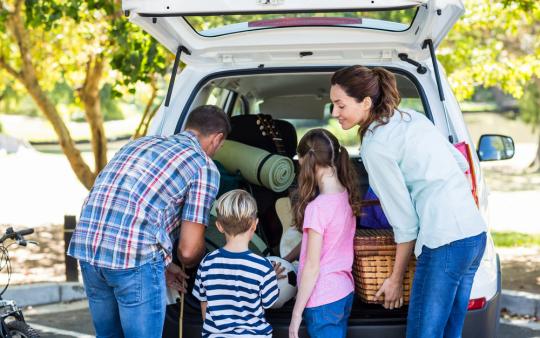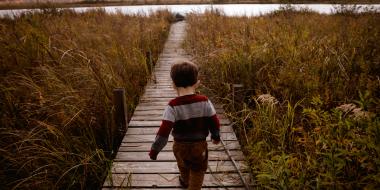Seeing the world, visiting friends and family, going to the cottage: whatever the vacation may be, having a relatively well rested child who will enjoy the time away will be key.
There really is no way of knowing how your child will adjust to being away from home, however, there are a few things you can do to prepare your child for the time spent away from home and their sleep space.
If you have never travelled with your child before, you can set up the playpen a couple of days beforehand and have them nap in there for one or two of their naps to create a sense of familiarity and routine. If you are not bringing a playpen or your child has outgrown it, you can still use these tips to help them through.
- Bring the sheet they currently have on their bed
- Ask for a crib at a hotel to mimic their sleep enviornment at home
- Bring all of their sleep stuff - blanket, cuddle friend, soother - to again mimic their environment and feeling of security
- Acclimate them to the room - spend time in the room to help them become comfortable in it
- Bring a sound machine if that has worked for you in the past, especially to drown out unfamiliar noises
- Consider bringing garbage bags for the windows to make the room as dark as you can
- Comfort items from home to be in the space can also help create a sense of familiarity
- Books they love can help trigger their sense of routine
- Stick to your schedule as much as possible
On the go naps
If you have to go out during a naptime, bring something they can sleep in such as a stroller, carrier etc. Try and make the on the go nap the morning nap as the afternoon nap is the most important nap of the day.
- Stick to the schedule even while out and about
- If possible, stop movement while they are sleeping
- If you have the choice between on the go for morning or afternoon naps, we would highly recommend morning nap on the go and afternoon nap in bed
Travelling to a different time zone
If you are travelling West, taking a couple of days before leaving to try and shift your schedule by 30 minute increments can help them adjust once you arrive at your destination. If the home schedule is 7-7, try and shift it to 8-8 before leaving. Once there, you can either keep the 8-8 home time or push it again by another hour, depening on what the needs of the trip dictate.
If you are travelling East and the time change is under 2 hours, we would recommend keeping your schedule (instead of 7-7, do a 9-9) or you can adjust it by an hour if you would like your evening to be child free! If you are gone for a week or less, trying to adjust your child to the new time may not be worth the effort.
Once you arrive
- Get plenty of sunshine to help reset the circadian rhythm
- Be active and allow them to expend all their energy
- Make the day you arrive a free day to explore
- Wake them at their typical morning wake time as soon as possible
- If they are waking early, stretch the day as much as possible without getting them too tired to try and get them back on schedule
- Make the adjustment to the meal schedule as quickly as possible
Light and dark
It will be very important to expose your child to natural daylight as much as possible starting from day 1 of your vacation. It is equally important to ensure that for naps and bedtime the room is as dark as can be. Natural, unfiltered daylight during waking hours and dark while sleeping will help your child’s internal clock (the circadian rhythm) reset.
Take a deep breath and support them if they need it
Your child will be able to feel your anxiety and stress when it comes to sleeping in a new place. Try and take a deep breath, relax and if your little one is not managing the new sleep space, give them more support and know that when you return home you will get back on track!






